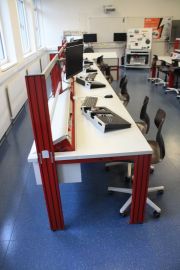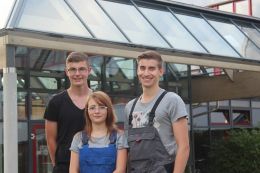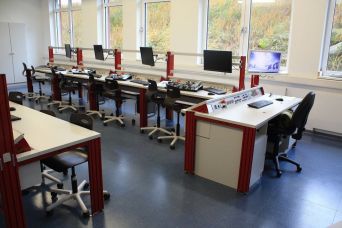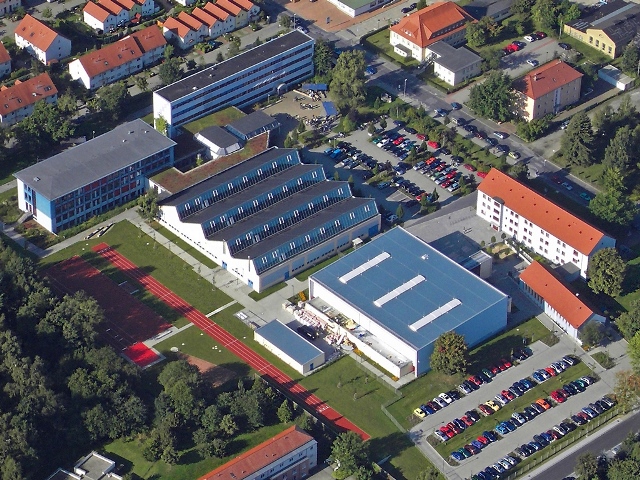Boosting Independent Learning in the Lab
BSZ Radeberg, a German vocational training centre, wants to use the concept of laboratory learning to didactically restructure its in-house teaching. The aim is to boost independence during the learning process at the vocational school and increase the time available for the provision of individual support by teachers. BSZ is relying on lab solutions from Kerpen to implement this concept.
The aim is to boost independence during the learning process at the vocational school and increase the time available for the provision of individual support by teachers. BSZ is relying on lab solutions from Kerpen to implement this concept.
“Our laboratory equipment was worn, both technically and in terms of specialist subject content, and simply didn’t satisfy the requirements of up-to-date training any more,” says Steffen Wobst, looking back. The Automotive teacher at BSZ Radeberg was pleased, therefore, with the decision in 2017 to make a major investment in the Automotive labs in Radeberg. “After that we reached an agreement on the didactic objectives that we want to achieve using the new technology,” says Wobst, recalling the joint planning process with his colleague Volker König, consultant Ms Nowak and the school management. He adds that the result was clear very quickly: besides sound teaching of the basics, the students should be enabled to gain an understanding of the systems largely autonomously in group lessons. The aim for the teachers themselves was to play an increased role as facilitators for the students. The importance of students being able to apply theory in practice was also stressed.
Good understanding and good experience: Lucas-Nülle is the first point of contact
 Wobst and König are glad to answer the question as to why the centre decided to implement this concept with systems from Lucas-Nülle.“ Above all, Lucas-Nülle was an exact fit for this pre-defined requirements profile,” says König. At the same time, BSZ Radeberg was already using systems from Kerpen, which it wanted to integrate into the new laboratory in the best possible way. “Another point that shouldnot be forgotten is the remarkably intensive support that Lucas-Nülle provides to our teachers – based on a strong tradition in this area,” says König, emphasizing the successful cooperation. “Many of our colleagues had already been to training events in Kerpen and therefore had an idea of what to expect with regard to the laboratory equipment.” The new laboratories have been fully equipped since August 2018. They contain training systems that cover the entire range of automotive training topics, starting from the fundamentals of automotive technology. Building on this, complex topics such as lighting and comfort systems or vehicle diagnostics are also covered, with the appropriate system in each case ensuring a high level of practical relevance in lessons.
Wobst and König are glad to answer the question as to why the centre decided to implement this concept with systems from Lucas-Nülle.“ Above all, Lucas-Nülle was an exact fit for this pre-defined requirements profile,” says König. At the same time, BSZ Radeberg was already using systems from Kerpen, which it wanted to integrate into the new laboratory in the best possible way. “Another point that shouldnot be forgotten is the remarkably intensive support that Lucas-Nülle provides to our teachers – based on a strong tradition in this area,” says König, emphasizing the successful cooperation. “Many of our colleagues had already been to training events in Kerpen and therefore had an idea of what to expect with regard to the laboratory equipment.” The new laboratories have been fully equipped since August 2018. They contain training systems that cover the entire range of automotive training topics, starting from the fundamentals of automotive technology. Building on this, complex topics such as lighting and comfort systems or vehicle diagnostics are also covered, with the appropriate system in each case ensuring a high level of practical relevance in lessons.
|
“The aim of group lessons is to provide technical know-how, of course, but we also |
Initial practical experience shows individual support potential
“The students and trainees find working with the training systems very demanding, particularly when independent planning and action are required,” says Wobst, drawing an initial conclusion about the  application. He confirms that individual differences manifest themselves more strongly in group laboratory classes: “In our experience, trainees with insufficient previous scientific knowledge find it difficult to fully engage with the possibilities offered by laboratory learning.
application. He confirms that individual differences manifest themselves more strongly in group laboratory classes: “In our experience, trainees with insufficient previous scientific knowledge find it difficult to fully engage with the possibilities offered by laboratory learning.
In contrast, the systems offer fast-learning trainees many opportunities to get actively involved in lessons and enhance their knowledge of the subject.” The teachers too have already had their share of homework to do thanks to the systems. “The new possibilities mean that more preparation is required during the familiarization phase,” König confirms, “but simply working through the courses in the manner of a box-ticking exercise would frankly not be doing the possibilities of the new technology justice." Planning the use of space also presented a challenge to the BSZ initially. “We had never experienced such an abundance of learning areas covered by training systems, nor their use for several disciplines in one room,” König recalls.
|
“All in all, this laboratory and the associated interconnection of software |
The centre in Radeberg is well positioned for the future
Laboratory teaching helps all the trainees in terms of working, recognizing and assessing independently. They now gain more time in class thanks to the new training systems. “I think trainees are increasingly working in partnership with the teacher and are engaged more actively in shaping their own educational success,” says Wobst, looking to the future, “but the teacher will remain the central agent of knowledge transfer. We, the teachers, are best placed for the task of exerting intensive influence on the trainees.”
